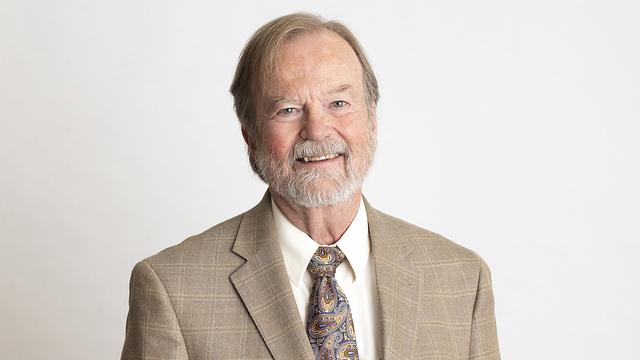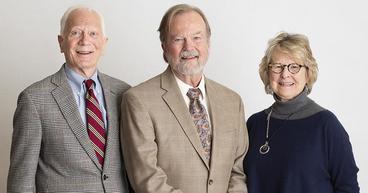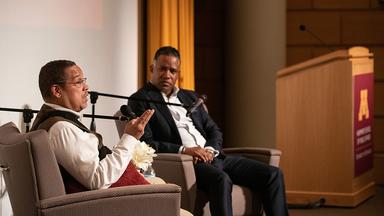By J. Trout Lowen
Humphrey School Professor John Bryson is retiring at the end of this month, one of three longtime faculty members who have come to the end of their careers in 2020. He joins Professors Melissa Stone and Robert Kudrle, both of whom retired in May.
Each has dedicated decades to the School, from its fledgling days as the School of Public Affairs when it was part of the College of Liberal Arts, through the birth of the Humphrey Institute in 1978, to its renaming as the Humphrey School of Public Affairs in 2011.
Each has shaped the thinking and careers of thousands of University of Minnesota students, many of whom are now shaping the world we live in and the one we will leave behind.
Individually and collectively their scholarship has advanced and broadened the field of public affairs. Their careers have been both reflective of and instrumental to the growth and development of the Humphrey School.
Here is a look at the career of John Bryson.
---
Melissa Stone. All three longtime faculty members retired
in 2020. Photo: Josh Kohanek
Bryson is one of the most distinguished experts in the fields of strategic planning, leadership, and collaborations, but his path to the ivory tower was anything but straight.
After graduating from college in 1969, Bryson was looking for a way to avoid the draft and the Vietnam War. He volunteered for VISTA, an antipoverty program, to get a deferment. It was a decision that would change the trajectory of his career. Although he had no planning experience, the Office of Economic Opportunity made him a planner.
The federal agency, which was administering most of the War on Poverty programs, sent him to Augusta, Georgia, to help shore up a large, complex community action organization. At the time, Augusta was one of the most impoverished cities in the country. It was baptism by fire.
“That whole two-year period had a tremendous impact on me,” he recalls. “I was just a 22-year-old kid from the North. I didn’t know what planning was.”
His two-year stint as a VISTA volunteer taught him about more than planning; he also learned about the importance of politics and leadership, and about strategy, organizing, and collaboration. It also opened his eyes to the country’s inequalities and institutional racism. Those themes would be foundational to Bryson’s research throughout his career.
Augusta is also where he met his wife and future research collaborator, Humphrey School Associate Professor Emerita Barbara Crosby, who was working there as a local newspaper reporter.
After VISTA, Bryson earned a master’s degree in public policy and public administration, and a master’s and doctorate in urban and regional planning, all from the University of Wisconsin-Madison. He arrived at the University of Minnesota in 1977, just as the School of Public Affairs was becoming the Humphrey Institute of Public Affairs.
The importance of 'ought'
It was Robert Einsweiler, director of the Humphrey master’s program in urban and regional planning, who was instrumental in luring Bryson to the Humphrey, and, perhaps more importantly, in helping him understand the focus of the work that would occupy him for the next four decades.
“He’s the one who pointed out to me that I was interested in two questions,” Bryson recalls. “The first is: how do people in groups and organizations figure out what they think they ought to want and how to get it? The second is: how can you help people in groups and organizations figure out what they think they ought to want and how to get it?”
The word “ought” is key to those questions, Bryson explains. What people want and what they ought to want is often the difference between immediate gratification (what we want now) and delayed gratification. For example, maybe we ought to want to increase our taxes, because if they were spent wisely they might help us improve our communities in the long run in terms of health, infrastructure, education, job creation, safety, and so on.
In seeking answers to those two questions, Bryson developed expertise in the areas of strategic planning, leadership, and collaboration. He has written and co-written more than 20 books, including the seminal text, Strategic Planning for Public and Nonprofit Organizations, now in its fifth edition and cited over 7,000 times. He has authored or co-authored chapters in dozens of books and scores of journal articles and received awards and accolades in abundance, including lifetime scholarly achievement awards from four different academic professional associations.
Even so, Bryson says his interests did not always feel like a good fit at the Humphrey School. Especially early in his career, he says, topics such as leadership, collaboration, strategic planning, and community engagement were mostly not appreciated, researched, or taught in schools of public affairs. But that has changed, as has the world. These topics have become much more the norm, and Bryson has played a significant role in bringing about that change.
Influence inside and outside academia
In 2007, Bryson was named McKnight Presidential Professor of Planning and Public Affairs. In 2015, two articles Bryson co-authored were named to the list of the 75 most influential articles published in Public Administration Review during its 75-year history, including “The Design and Implementation of Cross-Sector Collaborations: Propositions from the Literature” (2006), which he co-authored with colleagues Crosby and Melissa Stone. The article has been cited in scholarly works almost 2,500 times.
Bryson and Crosby, along with former colleague Sharon Anderson, also co-founded the School’s Master of Public Affairs program for mid-career professionals seeking to advance their skills in public and nonprofit leadership, management, and policy analysis.
Bryson’s influence has extended well beyond academia. His work has had major impacts on how organizations engage in strategic planning across the world at the international, national, subnational, and local levels.
Despite the recognition and the awards he has received, Bryson says he is still surprised and pleased to learn how his work is influencing others.
“I’m just really proud of having played a role, not just here but in the larger academic world, in helping establish strategic planning, leadership, and collaboration as academic fields, and in helping that work have a major impact on the world of practice,” he says. “When I was younger, it’s just not something I would have imagined would happen. I never imagined I would write things that would have an actual impact on the world.”
J. Trout Lowen is a Minneapolis freelance writer and editor.



